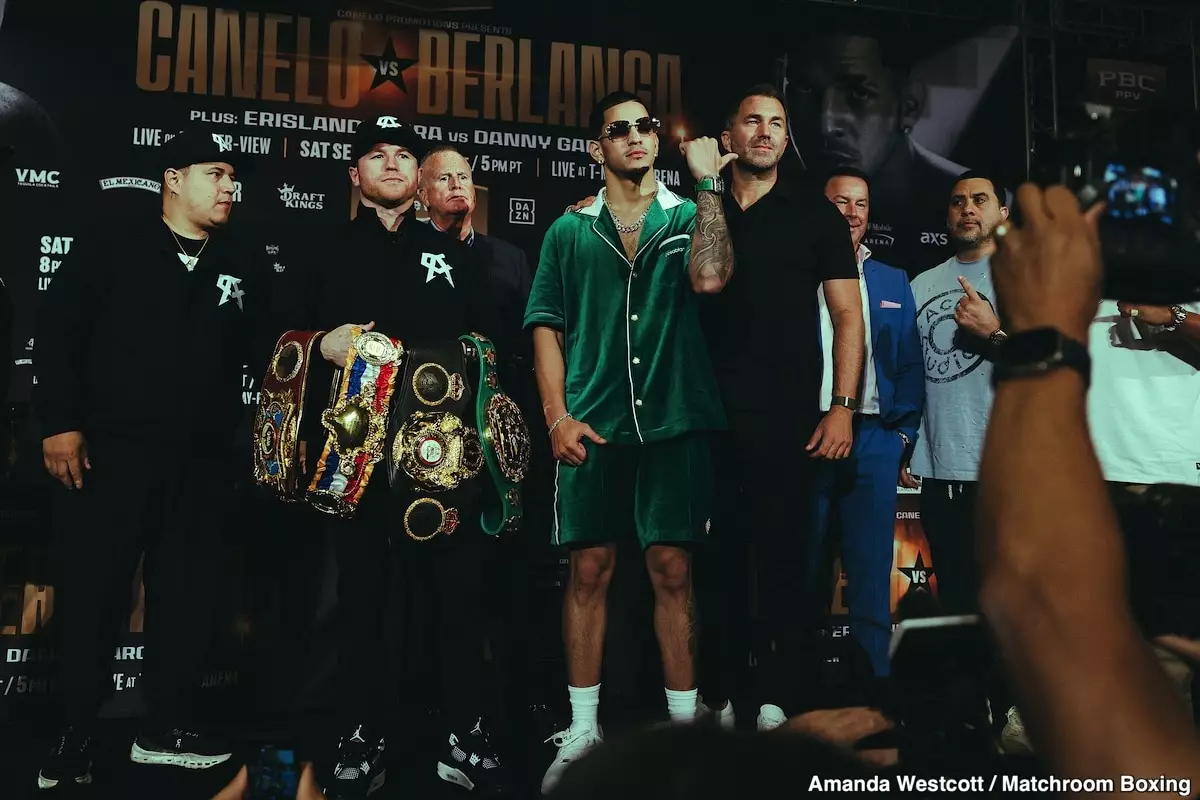In the dynamic world of boxing promotion, there’s no denying that Eddie Hearn is a key player, often stirring conversations not only for his promotional tactics but also for his bold predictions. As the fights between Canelo Alvarez and Edgar Berlanga, and Anthony Joshua and Daniel Dubois approach, Hearn has made some audacious claims that warrant scrutiny. This analysis delves into Hearn’s assessments, evaluating the implications and realities of these high-stakes bouts.
Eddie Hearn has made waves by backing Edgar Berlanga, a fighter labeled an underdog with odds as high as 11/1 against Canelo Alvarez. This situation prompts discussions about the nature of underdog performances in boxing. Historically, underdogs have flourished in the ring, but they usually rely on a singular moment of glory—a powerful punch that changes the fight’s momentum. However, Hearn’s optimism extends beyond just a puncher’s chance, as he predicts a points victory for Berlanga, emphasizing the necessity of a well-structured beginning in the fight.
Hearn’s confidence in Berlanga’s mindset and preparation opens up a broader dialogue about how mental fortitude plays into boxing outcomes. Mental preparedness can oftentimes be the deciding factor in high-pressure situations, especially for fighters stepping up against established stars like Canelo. If Berlanga can secure a strong start and impose his strategy early on, as Hearn suggests, it shifts the narrative from predictable outcomes toward potential growth and opportunity.
However, it remains essential to recognize that Canelo Alvarez is not only a seasoned champion but also a fighter known for his adaptability and tactical brilliance. Experts predominantly argue that Berlanga’s best chance lies in delivering a decisive blow rather than outworking his opponent over several rounds. Thus, Hearn’s prediction presents a stark contrast to conventional wisdom, raising the question: does he genuinely believe in Berlanga’s capability to adapt, or is this merely a promotional play?
Shifting gears to the heavyweight clash, Hearn’s support for Anthony Joshua seems more predictable. Having managed Joshua over several years, Hearn’s prediction of a quick finish against Dubois shouldn’t come as a surprise. His assertion that Joshua could close the fight in just three rounds reflects not only Hearn’s belief in Joshua’s abilities but perhaps also an acknowledgment of Dubois’s tendencies.
There’s merit in Hearn’s analysis of Dubois’s approach. Historically, Dubois has demonstrated bouts of aggression that can compromise his technical skill. If he enters the ring with reckless abandonment, it could very well spell disaster, giving Joshua the opening he needs to capitalize. In a sport where timing and precision are pivotal, a premature offensive strategy could lead Dubois into a trap set by a crafty opponent like Joshua.
Despite Hearn’s confidence, boxing is unpredictable. Dubois has the physical attributes and potential to inflict damage if he can keep his composure. This fight signifies a crossroads for both fighters: for Joshua, a victory could reaffirm his dominance in the division; for Dubois, it’s an opportunity to either emerge as a contender or further navigate the turbulent waters of heavyweight boxing.
Hearn’s bold predictions are strategic choices that resonate with fans, sparking interest and fueling narratives. Predictions, particularly in boxing, serve not only as a window into a promoter’s belief system but as a means of engaging the audience. The stakes are immensely high for both fights; the outcomes could alter trajectories in fighters’ careers and the boxing landscape at large.
In a sport so closely tied to human emotion and outcomes, boxing presents a unique set of variables that make predictions both risky and captivating. Hearn’s involvement emphasizes the theatrical aspect of boxing, where the lines between reality and expectation often blur.
Ultimately, these impending matchups serve as a reminder of why boxing remains a beloved sport. Personal stories, narratives of struggle and triumph, and the perpetual quest for legacy anchor fighters and their fans alike. Whether Hearn’s predictions prove accurate—via experienced assessments or mere speculation—they undeniably shape the buildup to what could be unforgettable fights in the annals of boxing history.

